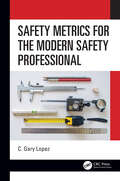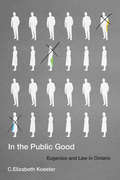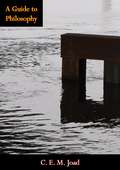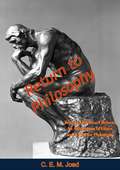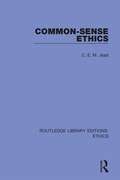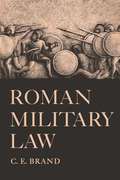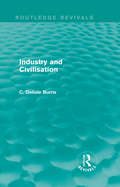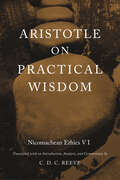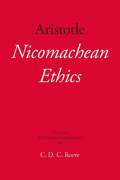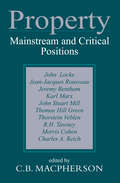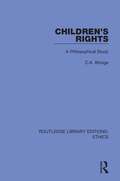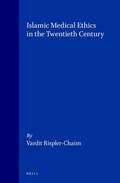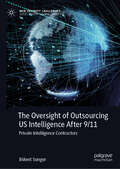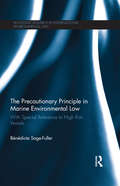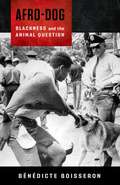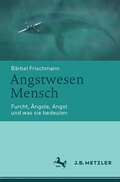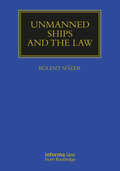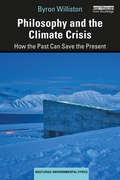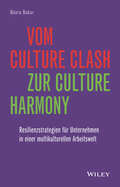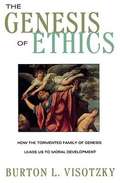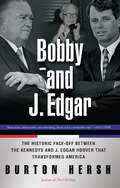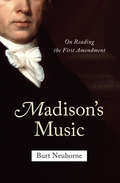- Table View
- List View
Safety Metrics for the Modern Safety Professional
by C. Gary LopezThis book investigates the world of leading indicators and explores how they can be used effectively, providing 21st-century safety professionals with alternative metrics and guidance, which will enable them to make a difference in managing risk within an organization. The safety and health profession has been hindered by ineffective metrics for decades, with the primary metrics of choice being the OSHA incident rate and lost time accident rate. This narrow focus on what constitutes loss is not in line with the new concepts of managing the total risk that an organization faces. The book looks at indicators on a tactical level where they can be very effective in providing management with clear direction and "manageable" items they can utilize to elevate the safety efforts of an organization. It also explores the limitations of leading indicators at the strategic level and how they’re tied into the management merit review system to determine bonus and salary increase structures. It features measurements of areas of loss not usually considered by safety managers, suggests ways to use leading indicators, and promotes a departure from traditional "body count" thinking. This book will be of interest to safety professionals involved in risk management in the modern workplace.
In the Public Good: Eugenics and Law in Ontario (McGill-Queen's/Associated Medical Services Studies in the History of Medicine, Health, and Society #57)
by C. Elizabeth KoesterIn the early twentieth century, the eugenics movement won many supporters with its promise that social ills such as venereal disease, alcoholism, and so-called feeble-mindedness, along with many other conditions, could be eliminated by selective human breeding and other measures. The provinces of Alberta and British Columbia passed legislation requiring that certain “unfit” individuals undergo reproductive sterilization. Ontario, being home to many leading proponents of eugenics, came close to doing the same.In the Public Good examines three legal processes that were used to advance eugenic ideas in Ontario between 1910 and 1938: legislative bills, provincial royal commissions, and the criminal trial of a young woman accused of distributing birth control information. Taken together, they reveal who in the province supported these ideas, how they were understood in relation to the public good, and how they were debated. Elizabeth Koester shows the ways in which the law was used both to promote and to deflect eugenics, and how the concept of the public good was used by supporters to add power to their cause.With eugenic thinking finding new footholds in the possibilities offered by reproductive technologies, proposals to link welfare entitlement to “voluntary” sterilization, and concerns about immigration, In the Public Good adds depth to our understanding. Its exploration of the historical relationship between eugenics and law in Ontario prepares us to face the implications of “newgenics” today.
Guide to Philosophy
by C. E. M. JoadJoad's 'Guide to Philosophy' examines systematically but non-technically the central questions of philosophical thought since classical times—Is there a plan to the universe? Is mind unique and independent or a mere secretion of the brain? Is there such a thing as free will? These and similar questions in the theory of knowledge and in metaphysics are introduced, the reasons why they are so much discussed are shown, and the methods by which the discussions have been pursued through the centuries are illustrated. The examination is, for the most part, in terms of opposed solutions- subjective idealism vs. realism, teleology vs. chance, causation vs. temporalism, logical positivism vs. vitalism and modern idealism. Under each problem area, the contributions of each of the major philosophers—Plato, Aristotle, the Scholastics, Kant, Hegel, Leibnitz, William James, and many others—are considered, with such milestones as Plato's theory of ideas, Aristotle's criticism, Kant's and Hegel's philosophical systems, Bergson's philosophy, and Whitehead's philosophy each receiving a chapter or more.
Return to Philosophy: Being A Defence of Reason, An Affirmation of Values, and A Plea for Philosophy
by C. E. M. Joad“Many people today adopt an instinctively derogatory attitude to reason. It is not, they say, a free activity of the mind, reaching conclusions under no compulsion save that of the evidence; it is the tool of instinct and the handmaid of desire. They are sceptical also in their attitude towards values. Beauty, they hold, is not an intrinsic quality of things; it is merely the compliment which we bestow upon the objects which have been fortunate enough to give us pleasure. One man’s pleasure is as good as another’s, and all the art criticism in the world is only an elaborate series of variations upon the theme: ‘This is what I happen to like.’ As with art, so with morals. To act rightly is merely to act in a way of which other people approve.“It is the object of the following pages to criticize this subjectivist attitude and to expose its inadequacy in art, in morals, and in thought. The book is, therefore, in effect a restatement in modern terms of certain traditional beliefs; that reason, if properly employed, can give us truth; that beauty is a real value which exists, and that we can train our minds and form our tastes to discern it; that some things are really right in a sense in which others are really wrong, and that the endeavour to know truth and to discern value is the noblest pursuit of the adult civilized intelligence. The best name for this pursuit is philosophy. This conclusion is reached by a number of different routes, each of which starting from some distinctive characteristic of modern life or thought, an aeroplane shed, a quasi-religious cult, or an essay of Aldous Huxley converges upon the same position. The defence of reason, the affirmation of values and the plea for philosophy thus constitute the underlying theme which links together the various essays which follow.”—Foreword
Common-Sense Ethics
by C. E. JoadOriginally published in 1921, this book makes philosophical ethics accessible to the non-philosopher and applies them to problems of everyday life. The author maintains that morality is the rationalization of the impulse to blame and emphases the importance of impulses. He illustrates how modern society conspires to suppress impulses and restrict their operation.
Roman Military Law
by C. E. BrandRome was the law-giver for much of the modern world. She was also the greatest military power of antiquity, operating her military organization with remarkable efficiency and effectiveness throughout most of the then-known world. In view of the importance of both the legal and military aspects of the Roman Empire, an account of their combination in a system of disciplinary control for the Roman armies is of considerable significance to historians in both fields-and, in fact, to scholars in general. In Roman Military Law,C. E. Brand describes this system of control. Since a characterization of such a system can be made most meaningful only against a background of Roman constitutional government and in the light of ideologies current at the time, Brand follows his initial "Note on Sources" with a sketch of the contemporary Roman scene. This first section includes a discussion of the Roman constitution and an examination ofRoman criminal law. The history of Rome, as a republic, principate, and empire, extended over a period of a thousand years, so any attempt to represent a generalized picture must be essentially a matter of extraction and condensation from the voluminous literature of the whole era. Nevertheless, from the fantastic evolution that is the history of Rome, Brand has been able to construct a more or less static historical mosaic that may be considered typically"Roman. " This comes into sharpest focus during the period of the PunicWars, when the city and its people were most intensely Roman. The picture of the Roman armies is set into this basic framework, in chapters dealing with military organization, disciplinary organization, religion and discipline, and offenses and punishments. The final section of the book considers briefly the vast changes in Romaninstitutions that came about under the armies of the Empire, and then concludes with the Latin text and an English translation of the only knowncode of Roman military justice, promulgated sometime during the laterEmpire, preserved in Byzantine literature, and handed down to medieval times in Latin translations of Byzantine Greek law, which it has heretofore been confused.
Industry and Civilisation (Routledge Revivals)
by C. Delisle BurnsOriginally published in 1925, Industry and Civilisation explores moral standards and ethics related to economic activities by providing a comprehensive view of psychological data obtained from the business world. As well as exploring general ethics and psychology, this work also focusses on the principles underlying economic legislation and how this impacted on moral standards of the time. This title will be of interest to students of Business and Economics.
Aristotle on Practical Wisdom: <i>Nicomachean Ethics</i> VI
by C. D. ReeveNicomachean Ethics VI is considered one of classical philosophy’s greatest achievements. Aristotle on Practical Wisdom is the first full-scale commentary on this work to be issued in over a century, and is the most comprehensive and philosophically illuminating to date. A meticulous translation coupled with facing-page analysis enables readers to engage directly with the account of phronêsis or practical wisdom that Aristotle is developing, while a full introduction locates that account in the context of his ethical thought and of later ethical thought more generally. The commentary discusses the text line by line, illuminating obscure passages, explaining technical ones, and providing a new overall interpretation of the work and the nature of practical reason.A companion volume, Action, Contemplation, and Happiness, expands on this interpretation to provide a startling new picture of Aristotle’s thought as a whole. Although the two books can be approached separately, together they constitute one of the most daring and original contemporary readings of Aristotle’s philosophy. Aimed at committed students of these notoriously difficult writings, C. D. C. Reeve’s engaging and lucid books should find a wide audience among philosophers, classicists, and all readers willing to wrestle with a thinker of unparalleled subtlety, depth, and scope.
Nicomachean Ethics
by Aristotle C. D. ReeveAn excellent new translation and commentary. It will serve newcomers as an informative, accessible introduction to the Nicomachean Ethics and to many issues in Aristotle's philosophy, but also has much to offer advanced scholars. The commentary is noteworthy for its frequent citations of relevant passages from other works in Aristotle's corpus, which often shed new light on the texts. Reeve's translation is meticulous: it hits the virtuous mean--accurate and technical, yet readable--between translation's vicious extremes of faithlessness and indigestibility.--Jessica Moss, New York University
Property
by C. B. MacphersonThe legitimate role of the state in relation to property and the justification of property institutions of various kinds are matters of increasing concern in the modern world. Political and social theorists, jurists, economists, and historians have taken positions for and against the property institutions upheld in their time by the state, and further dehate seems inevitable. This book brings together ten classic statements which set out the main arguments that are now appealed to and places them in historical and critical perspective.The extracts presented here - all substantial - are from Loeke, Rousseau, Bentham, Marx, Mill, Green, Veblen, Tawney, Morris Cohen, and Charles Reich. A note hy the editor at the head of each extract highlights the arguments in it and relates it to the time at which it was written. Professor Macpherson's introductory and concluding essays expose the roots of some common misconceptions of property, identify current changes in the concept of property, and predict future changes. Macpherson argues that a specific change in the concept (which now appears possible) is needed to rescue liberal democracy from its present impasse.Property is both a valuable text on a crucial topic in political and social theory and a significant contribution to the continuing debate
Children's Rights: A Philosophical Study
by C. A. WringeOriginally published in 1981, this book provides a detailed account of the emergence of the children’s rights movement, and analyses the concept of a right. It considers the justifications which may be sought when rights are claimed. Particular attention is given to the problem which arises when different rights are seen to be in conflict with each other or with other kinds of moral consideration. These arguments are then examined with regard to such special features of children as their incomplete but developing rationality and their material dependence on adults.
Islamic Medical Ethics In The Twentieth Century
by C. A. O. van NieuwenhuijzeConsiders prominent issues in medical ethics in the 20th century, such as abortion, artificial insemination, organ transplantation, euthanasia as discussed by Muslim religious scholars, physicians and jurists. Despite the semi-equal spread of medical knowledge among the peoples of the world and the shared dilemmas brought about by modern medicine, Muslims tend to follow their own medical ethics, which agree ultimately with the basic requirements of Islamic religion and law.
The Oversight of Outsourcing US Intelligence After 9/11: Private Intelligence Contractors (New Security Challenges)
by Bülent SungurThis book is a story about Private Intelligence Contractors (PICs) and their relationship with the United States executive and legislative principals in the War on Terror when the line between the public and private sectors has been increasingly blurred. PICs have challenged the traditional approach which assumes that sensitive intelligence tasks should be performed by government officials because of their importance for national security. So this book examines the principal-agent relationship and the oversight problem between PICs, the US Intelligence Community (IC), the president and Congress after the 9/11 attacks. The book demonstrates that by exploiting information asymmetry, adversely selected PICs can violate legislative rules and goals such as by performing inherently governmental tasks, colluding with the IC, capturing the control of the task and contractual process, abuse, waste and fraud. In addition, to get around congressional oversight and achieve his or her hidden agenda, the executive principal can also mismanage contractors through the IC or delegate contractors to perform inherently governmental tasks.
The Precautionary Principle in Marine Environmental Law: With Special Reference to High Risk Vessels (Routledge Research in International Environmental Law)
by Bénédicte Sage-FullerThe book examines whether the jurisdiction of coastal States under international law can be extended to include powers of intervention towards vessels posing a significant risk to their coastal and marine environment, but which have not yet been involved in any incident or accident. The books sets out how it is that coastal State jurisdiction can indeed be seen as including powers of intervention towards High Risks Vessels before an incident or accident happens, on the basis of the precautionary principle. The precautionary principle requires taking action when a risk of damage to the environment is suspected, but cannot be confirmed scientifically.The book thus considers the potential opportunities for the coastal state under international law to regulate international shipping where they consider vessels to an unacceptable risk to the environment, in order to prevent or minimise the risk of occurrence of the accident or incident leading to damage. The book acknowledges that this puts into question some very old and established principles of the law of the sea, most importantly the principle of freedom of navigation. But Bénédicte Sage-Fuller contends that this change would itself be a consequence of the evolution, since the end of WWII, of on the one hand international law of the sea itself, and of international environmental law on the other hand.
Afro-Dog: Blackness and the Animal Question
by Bénédicte BoisseronThe animal-rights organization PETA asked “Are Animals the New Slaves?” in a controversial 2005 fundraising campaign; that same year, after the Humane Society rescued pets in the aftermath of Hurricane Katrina while black residents were neglected, some declared that white America cares more about pets than black people. These are but two recent examples of a centuries-long history in which black life has been pitted against animal life. Does comparing human and animal suffering trivialize black pain, or might the intersections of racialization and animalization shed light on interlinked forms of oppression?In Afro-Dog, Bénédicte Boisseron investigates the relationship between race and the animal in the history and culture of the Americas and the black Atlantic, exposing a hegemonic system that compulsively links and opposes blackness and animality to measure the value of life. She analyzes the association between black civil disobedience and canine repression, a history that spans the era of slavery through the use of police dogs against protesters during the civil rights movement of the 1960s to today in places like Ferguson, Missouri. She also traces the lineage of blackness and the animal in Caribbean literature and struggles over minorities’ right to pet ownership alongside nuanced readings of Derrida and other French theorists. Drawing on recent debates on black lives and animal welfare, Afro-Dog reframes the fast-growing interest in human–animal relationships by positioning blackness as a focus of animal inquiry, opening new possibilities for animal studies and black studies to think side by side.
Angstwesen Mensch: Furcht, Ängste, Angst und was sie bedeuten
by Bärbel FrischmannAngst begleitet uns überallhin und jederzeit. Sie gehört zum Menschen. Der Mensch ist ein Angstwesen, und dies prägt sein Verhältnis zur Welt, zu anderen und zu sich selbst. Um die Bedeutung der verschiedenen Ängstigungsweisen zu erläutern, wird eine Unterscheidung von drei Grundfunktionen, affektive Furcht, gefühlte Ängste und geistige Angst, vorgeschlagen. Sie stellen jeweils spezifische Ausprägungen der überlebenswichtigen Gefahrenbewältigung dar, die beim Menschen nicht nur die körperliche Schutzfunktion umfasst, sondern auch durch gedankliche Antizipation möglicher Risiken und Bedrohungen geprägt ist. Aber vor allem die Angstgefühle können aus dem Gleichgewicht geraten, als leidvoll erlebt werden und sogar pathologisch werden. Deshalb soll am Ende auch die Hoffnung formuliert werden, dass Menschen die geistige Kraft besitzen, ihre Ängste sinnvoll in ihr Leben einzuordnen. Für eine differenzierte Sicht auf die Thematik werden zum einen einschlägige Theorien von Biologie über Psychologie bis Soziologie und Philosophie herangezogen, zum anderen die gewonnenen Ergebnisse mit Blick auf gesellschaftliche, politische und ideologisch-weltanschauliche Anwendungsbereiche vertieft.
Unmanned Ships and the Law (Maritime and Transport Law Library)
by BÜLENT SÖZERThis book considers the law relating to the legal aspects of unmanned ships. The author, a doyen of shipping and insurance law from Turkey, delves into the current international legal regime and examines the probable impact of unmanned ships on liability and carriage of goods in a wide-ranging manner. He examines both the legal aspects and technological peculiarities of unmanned ships, as well as contemplating terminological and linguistic questions, to find out whether they can be compatible with the current legal regime applicable to ships in general, while considering alternatives to enable their successful use in the near future. Unmanned Ships and the Law is therefore important not just for legal practitioners and academics in shipping and insurance but all those in related industries of shipbuilding, computer technology and communications.
Philosophy and the Climate Crisis: How the Past Can Save the Present (Routledge Environmental Ethics)
by Byron WillistonThis book explores how the history of philosophy can orient us to the new reality brought on by the climate crisis. If we understand the climate crisis as a deeply existential one, it can help to examine the way past philosophers responded to similar crises in their times. This book explores five past crises, each involving a unique form of collective trauma. These events—war, occupation, exile, scientific revolution and political revolution—inspired the philosophers to remake the whole world in thought, to construct a metaphysics. Williston distills a key intellectual innovation from each metaphysical system: • That political power must be constrained by knowledge of the climate system (Plato) • That ethical and political reasoning must be informed by care or love of the ecological whole (Augustine) • That we must enhance the design of the technosphere (Descartes) • That we must conceive the Earth as an internally complex system (Spinoza) • And that we must grant rights to anyone or anything—ultimately the Earth system itself—whose vital interests are threatened by the effects of climate change (Hegel). Philosophy and the Climate Crisis will be of great interest to students and scholars of climate change, environmental philosophy and ethics and the environmental humanities.
Vom Culture Clash zur Culture Harmony: Resilienzstrategien für Unternehmen in einer multikulturellen Arbeitswelt
by Busra BakarDas Buch von Dr. sc. Büsra Bakar beleuchtet die Herausforderungen und Chancen, die sich aus der zunehmenden Diversität am Arbeitsplatz ergeben. Es bietet einen tiefen Einblick in die Auswirkungen kultureller Unterschiede auf Teams und Organisationen und präsentiert gleichzeitig praxiserprobte Resilienzstrategien, um diese Vielfalt als strategischen Vorteil zu nutzen. Von interkulturellen Kommunikationshindernissen bis hin zur Förderung einer integrativen Unternehmenskultur bietet dieses Buch konkrete Lösungen für Führungskräfte und Teams, die in einer multikulturellen Umgebung erfolgreich sein wollen. Die Autorin erläutert, wie die Anpassungsfähigkeit gegenüber kulturellen Unterschieden nicht nur zu einem harmonischeren Arbeitsumfeld führt, sondern auch die Grundlage für langfristigen unternehmerischen Erfolg legt.
The Myth of the Robber Barons: A New Look at the Rise of Big Business in America (5th edition)
by Burton W. FolsomA new look at the Rise of Big Businesses in America.This book is a new look at entrepreneurs and government and the role of both in the rise of big business. It is a study of four industries--steamships, railroads, steel, and oil--and of the people who pushed the United States into world leadership in these industries.
The Genesis of Ethics
by Burton L. VisotzkyBurton L. Visotzky, one of America's most respected scholars of religion, guides readers through a close reading of the narratives of the Book of Genesis, exposing their brutal power and revealing how their moral dilemmas apply to ethical issues we face in our lives today. Rabbi Visotzky has led highly regarded seminars, attended by novelists, poets, editors, filmmakers and critics, Fortune 500 CEOs, bankers, and attorneys. He also was a major participant in Bill Moyers' PBS Genesis series. His reading of Genesis opens the door to moral development for all readers--Christians, Jews, Muslims, and secularists. As Burton Visotzky says, the Book of Genesis seems to be, at least on first reading, "an ugly little soap opera about a dysfunctional family . . . a story about rape, incest, murder, deception, brute force, sex, and blood lust. But these stories reveal much about human dilemmas and ethical problems that mirror our own lives. By delving into the lives of Abraham, Sarah, Isaac, and Esau and holding up these characters of Scripture to the light of critical inquiry, Burton Visotzky reveals much that is fresh and useful about ethics and morality. "He is a rabbi who is earthy, playful, and full of insight, who refuses to draw a veil over the dark side of the Bible or of our own contemporary experience. " --Thomas Cahill, author of How the Irish Saved Civilization "[Visotzky] has a wonderfully earthy, human touch to his commentary, a perspective that can be especially refreshing for Christians who have seen the 'Old Testament' sanitized or ignored by their own tradition. " --San Francisco Chronicle "Thrilling original insights . . . a new way to see and feel these old, old sentences. " --The New York Times Magazine "Visotzky delights in turning the gem of each story so that its facets, especially the darkest ones, gleam out at us. . . . The Genesis of Ethics is a unique contribution to Bible discussion. . . . One can only applaud and thank him. " --Naomi Rosen, Congress Monthly
Bobby and J. Edgar: The Historic Face-Off Between the Kennedys and J. Edgar Hoover that Transformed America
by Burton HershNOW WITH A NEW PREFACE In this riveting account of the explosive relationship between Robert F. Kennedy and J. Edgar Hoover, renowned journalist and author Burton Hersh sets their highly publicized clashes in the context of Joe Kennedy’s ongoing manipulation of Congress and his children’s careers, and his lifelong connections to organized crime. Theirs was a unique triumvirate, marked by conflict and betrayal, and culminating in a near-Shakespearean tragedy. Based on compelling new research, and told in gripping anecdotal style, Hersh chronicles the complex relationship between the two antagonists, from their early brushes during the McCarthy years to their controversial deaths.
Madison's Music: On Reading the First Amendment
by Burt Neuborne&“A detailed history of the transformation of First Amendment law&” from one of the nation&’s foremost civil liberties lawyers (The New York Times). Are you sitting down? It turns out that everything you learned about the First Amendment is wrong. For too long, we&’ve been treating small, isolated snippets of the text as infallible gospel without looking at the masterpiece of the whole. Legal luminary Burt Neuborne argues that the structure of the First Amendment as well as of the entire Bill of Rights was more intentional than most people realize, beginning with the internal freedom of conscience and working outward to freedom of expression and finally freedom of public association. This design, Neuborne argues, was not to protect discrete individual rights—such as the rights of corporations to spend unlimited amounts of money to influence elections—but to guarantee that the process of democracy continues without disenfranchisement, oppression, or injustice. Neuborne, who was the legal director of the ACLU and has argued numerous cases before the Supreme Court, invites us to hear the &“music&” within the form and content of Madison&’s carefully formulated text. When we hear Madison&’s music, a democratic ideal flowers in front of us, and we can see that the First Amendment gives us the tools to fight for campaign finance reform, the right to vote, equal rights in the military, the right to be full citizens, and the right to prevent corporations from riding roughshod over the weakest among us. Neuborne gives us an eloquent lesson in democracy that informs and inspires. &“In the dark art of lawyering, Neuborne has always been considered a white knight.&” —New York
The Counselor and the Law: A Guide to Legal and Ethical Practice (6th Edition)
by Anne Marie Wheeler Burt BertramAttorney Wheeler, who has experience with counselors and the mental health field, and Bertram, a counselor, marriage and family therapist, and counselor educator, help counselors and other mental health professionals understand the legal and ethical dilemmas that can arise in practice. They overview the counseling profession, counseling relationship, and law and ethics, and discuss federal and state laws; civil malpractice liability and licensure board complaints; confidentiality, privilege, and privacy; duties to report, warn, or protect; suicide and threats of harm to self; professional boundaries; records and documentation; and managing the counseling practice. This edition has a new chapter on the use of social media and other Internet-related issues, updates to the Health Insurance Portability and Accountability Act (HIPAA) through the Health Information Technology for Economic and Clinical Health (HITECH) Act and regulations, a new legal/ethical decision-making model, and discussion of legal risks for counselor educators, such as recent court cases involving students' work with lesbian, gay, bisexual, and transgender clients.
